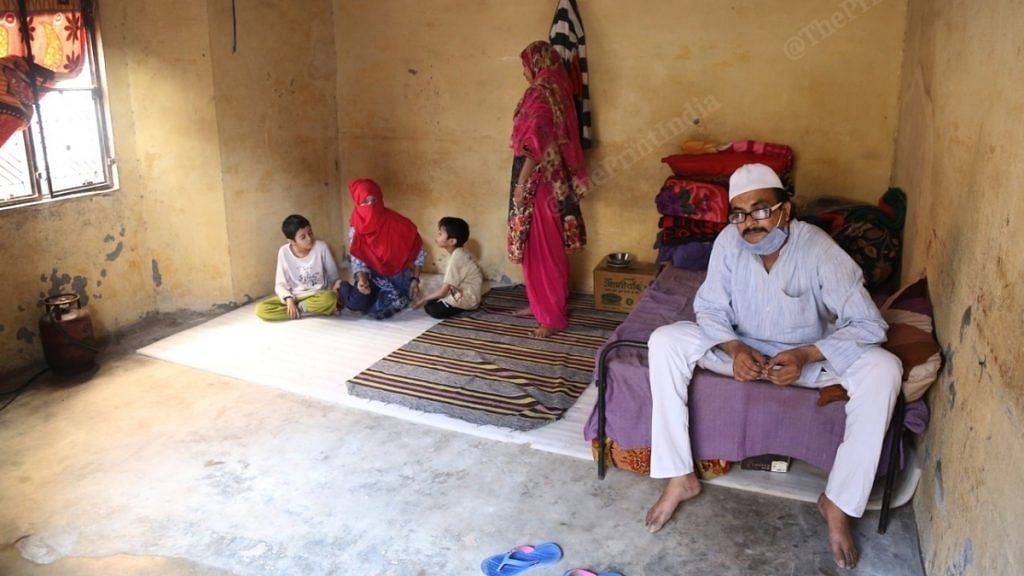New Delhi: Sageer Ahmed and wife Reshma Ahmed lost everything in the Northeast Delhi riots in February — their home attacked and belongings looted. Just when it seemed things couldn’t get any worse for them, the coronavirus pandemic and the subsequent nationwide lockdown struck a blow.
The couple with their three children moved to the Eidgah relief camp in Mustafabad, a place that doubled up as their home for the next one month, in the aftermath of the riots that left at least 53 dead. But on 24 March, the camp that housed close to 300 families was cleared up, with the riot victims given just 24 hours to find a place before the lockdown was imposed.
For two days, they had no roof over their heads.
“We spent two days just looking for a place to stay. There wasn’t a chance that we could go back to our destroyed home,” Sageer told ThePrint.
Finally, a landlord in Mustafabad decided to give a room to the family to stay in — without charging them anything. “They didn’t take a single penny from us. If it weren’t for them, we would have died somewhere on the streets,” Reshma told ThePrint.
Like Sageer and Reshma, several other families who had to vacate the relief camp, got help in a similar way.
“But at some point, we will run out of ration, and will need some sort of stability. We can’t survive like this for eternity,” said Saira Alam, who now lives with her husband and four children in a room a family has spared for them.
The relief camp organisers had given Rs 3,000 and some ration items to the families before asking them to leave. Besides this, some families who lost a kin in the riots had received a compensation amount from the Delhi government.
“The relief work has completely halted after the lockdown came into place. It has been very difficult to keep track of all the people and how the relief promised to them can be delivered,” a Delhi Waqf Board official associated with the relief work told ThePrint.
The Delhi Waqf Board, affiliated with the Delhi government, was involved with relief work for the riot victims, particularly at the Mustafabad camp.
“Since Amanatullah Khan vacated the position as chairperson, things haven’t had much of a structure,” added the official, who did not wish to be named.
Khan, an MLA of the ruling Aam Aadmi Party in Delhi, vacated the chair on 21 March, and there hasn’t been a replacement since then.
Another Waqf official said the body continues to get grievance calls from those who were living in the relief camp.
“We still receive hundreds of calls every day (from) many people who are yet to receive compensation, or any sort of aid. People are extremely stressed,” said Aaqib Khan, a Supreme Court advocate who was involved with the legal aid desk at the relief camp.
Also read: Minorities panel notice to Delhi Police for ‘random’ arrests of Muslims everyday for riots
‘No ration’
The streets of Mustafabad, one of the worst-affected areas in the riots, were thronged by many in search of ration Wednesday. Even with the lockdown in place, the residents said they have no option but to step out of their homes in arrange for food.
“I haven’t got any ration ever since the lockdown came into place. There are so many people here, who were displaced after the riots. The ration isn’t enough to make sure every family gets some,” Kesar Khatoon, a Mustafabad resident, told ThePrint.
Some NGOs have continued to work in the affected areas, distributing ration.
“The people here are just always looking for some ration here, some donation there. This is no way to live a dignified, stable life,” said Sabir Ali, coordinator of Aman Committee, a voluntary organisation engaged in relief activities.
‘We still feel very unsafe’
While several families are living at the mercy of people who opened the doors of a room in their houses for them, some others have tried to go back to their homes destroyed in the riots.
“We tried making peace with living in a half destroyed home, we have no other option,” Zubair Ahmed, a Shiv Vihar resident, told ThePrint.
Ahmed said his home was attacked and robbed, but his family has been trying to adjust there.
“It’s tough because we still feel very unsafe. Last Sunday when everyone lit diyas, there were some communal slogans raised in our area. We have been living under the fear that something or another might trigger another set of riots,” he added.
For many of the riot-hit, the lockdown has made their rehabilitation a distant dream. “We were just beginning to pick up the pieces, get back on our feet again. But now everything has been derailed again,” said another riot victim, who didn’t wish to be named.
Also read: ‘First quiet Shab-e-Barat, but for right reasons’: Delhi Muslims mark prayer night indoors
